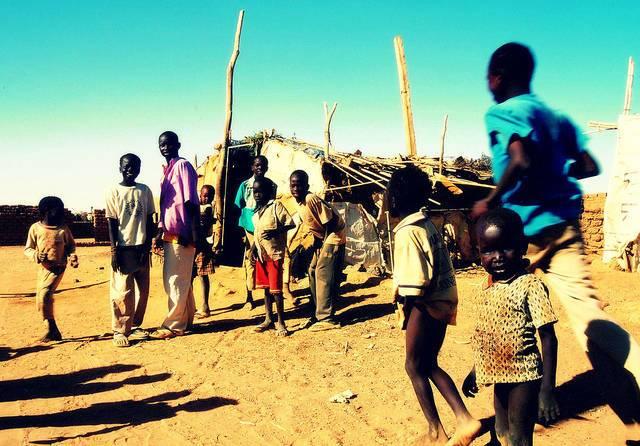
By Daphne Stanford
I can still remember the moment I realized that Americans are spoiled. It was the summer of 1995 and I’d just returned from a trip to Kenya. I drove to to the mall with my mother and watching people carry massive plastic shopping bags back toward the seemingly endless rows of shiny new cars, I felt sick to my stomach. Something had changed.
Fast forward to the year 2017. We have a former reality TV show host as our president, and the administration is replaying bad do-over sequels of the Cold War, but worse. At a time when famine has reached a crisis-tipping point, the current administration wants to cut aid for the places that need it most: South Sudan, Nigeria, Yemen, and Somalia. Meanwhile, plenty of funds have been added to the Pentagon’s already-bloated military budget.
But let’s forget about what #45 is doing, for a moment, and instead focus our attention on the discipline of geohealth—or, the intersection of geography and public health. In 1854, Dr. John Snow apparently identified a contaminated water source by using a map; Snow was able to connect that same source of water to an earlier cholera outbreak in England. In this way, public health and spatial sciences like surveying, geographic information systems, hydrography, and cartography have become increasingly intertwined.
Where this should lead medical professionals with an eye on geopolitics is straight to the African continent, but the situation is more complicated than that. The Sudanese government has threatened to raise the price of a travel/work Visa for an aid worker to $10K from $100—though the increase hasn’t been implemented, as of yet. Nonetheless, Jane Ferguson argues, “It’s a stark reminder to aid agencies that their relationship with the government is increasingly shaky.” Ferguson goes on to document how difficult documentation has become for journalists there; she says that, in ten years of reporting, Sudan’s current level of government intimidation is the worst she’s ever seen.
In light of these facts about refugee situations, it’s unconscionable to fail to take a refugee’s circumstances into consideration, when treating them in a professional setting. It’s critical that we all remain committed to ongoing cultural education about the state of the world we live in; a bit of empathy can transform people’s ability to understand the individual and cultural circumstances that led them to find themselves in their present situation, rather than fixating on relatively insignificant language or cultural differences. Healthcare professionals must implement integral practices that promote social justice, equality, and community wellness.
Despite everything, there seems to be hope in the form of increasing media exposure and relief aid workers in all affected nations—with the exception of South Sudan, where security and access are still a major obstacle to getting aid to where it’s most needed. Doctors Without Borders (a.k.a. Medecins Sans Frontieres) is there in limited numbers, but their access to many areas in South Sudan is severely restricted due to ongoing military conflict.
Luckily for future aid workers to any of these regions, as well as people native to the affected areas, a cholera vaccine was recently approved by the FDA for use in defense against the life-threatening disease. Ironically, cholera is relatively simple to treat, and much progress has been made through distributing kits: cholera simply must be treated promptly with antibiotics, oral rehydration salts, and fluid replacement. However, this is more easily said than done when water, food, and sanitation supplies are blocked from delivery to many regions via military force. The end result is malnutrition in many people, most devastatingly in children.
* * *
To pivot a bit, here, it’s arguable that many of the current refugee crises and resettlement situations can be traced to extreme climate change and fossil fuel-related conflict. In his recent piece for NY Mag that seems to have gone viral, David Wallace-Wells argues that climate change is directly tied to increases in armed conflict; and the industrialized world’s obsession with extracting as much oil as possible from the Middle East is connected to recent warming trends, as well. Wallace-Wells provocatively characterizes the current climate system as going to war with humans “for many centuries, perhaps until it destroys us.”He goes on to mention James Hansen, a leading climate scientist. Hansen stresses that, in addition to curbing rapid population growth, what’s desperately needed is “a simple, honest carbon price.” This is part of why education, research, discussion, and awareness of the connections between geographic regions, climate change, sea levels, and public health are so crucial to finding solutions to current climate crises, worldwide.
We must stand together to oppose policy decisions such as cuts to foreign aid at a time of unprecedented famine and warfare. We need leaders like Abby Maxman, President of Oxfam America, and others well-versed in diplomacy and critical thinking skills to take the helm, in the absence of any meaningful leadership in the current presidential administration. We can’t allow ourselves to become numb to the realities of the world’s needs, as a whole, while only being concerned with obtaining ever more unnecessary creature comforts here in the industrialized world.
* * *
Daphne Stanford writes poetry & nonfiction, and she believes in the power of art, education, and community radio to change the world. Since 2012, she’s been the host of The Poetry Show! Sundays at 5 p.m. on Radio Boise. Follow her on Twitter @TPS_on_KRBX.Image Source: Amnesty International
TriplePundit has published articles from over 1000 contributors. If you'd like to be a guest author, please get in touch!














